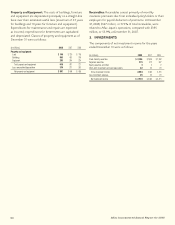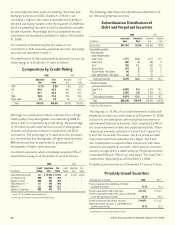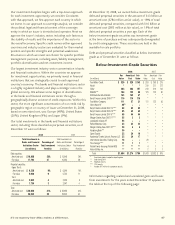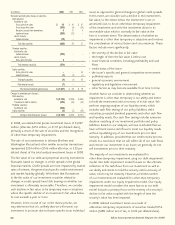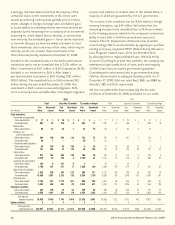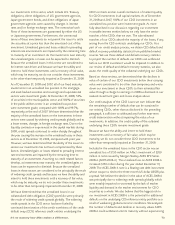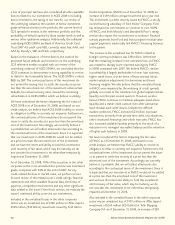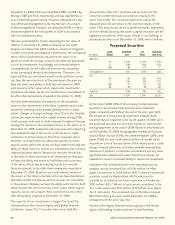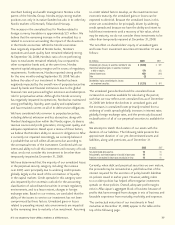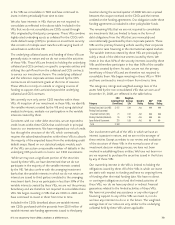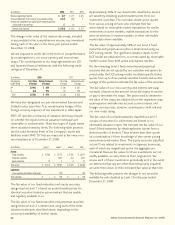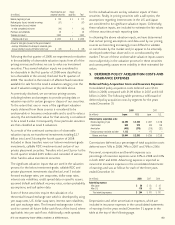Aflac 2008 Annual Report Download - page 78
Download and view the complete annual report
Please find page 78 of the 2008 Aflac annual report below. You can navigate through the pages in the report by either clicking on the pages listed below, or by using the keyword search tool below to find specific information within the annual report.
74 Aflac Incorporated Annual Report for 2008
a loss of principal. We have also considered all other available
factors related to our investment in ACES 2008-6 including,
but not limited to, the rating of our tranche, our review of
the underlying collateral, the number of below investment
grade reference entities in the portfolio, the current level of
CDS spreads for entities in the reference portfolio and the
probability of default implied by those market levels as well as
various other qualitative analyses. Additionally, the collateral
underlying ACES 2008-6 are Bank of America Credit Card
Trust 2007-A5 credit card ABS, currently rated Aaa, AAA, and
AAA by Moody’s, S&P, and Fitch, respectively.
Based on the evaluation of these factors, the outlook for
projected future defaults and recoveries on the underlying
CDS reference entities coupled with our review of the
underlying collateral of ACES 2008-6, we concluded that the
CDO continues to demonstrate a strong capability to service
its debt for the foreseeable future. The ACES 2008-6 is rated
BBB- by S&P. The contractual terms of this investment do
not permit the issuing trust to settle the security at a price
less than the amortized cost of the investment unless actual
defaults, less actual recovery rates, exceed the remaining
subordination in ACES 2008-6 which we believe is unlikely.
We have considered the factors impacting the fair value of
ACES 2008-6 as of December 31, 2008, and based on our
credit analysis, we believe that ACES 2008-6 ability to service
its obligation to Aflac is currently not impaired. Furthermore,
the contractual terms of this investment do not permit the
issuer to settle the security at a price less than the amortized
cost of the investment. Accordingly, we currently believe it
is probable that we will collect all amounts due according to
the contractual terms of the investment. Since it is expected
that our investment in ACES 2008-06 would not be settled
at a price less than the amortized cost of the investment
and we have the intent and ability to hold this investment
until recovery of fair value, which may be maturity, we do
not consider this investment to be other-than-temporarily
impaired at December 31, 2008.
As of December 31, 2008, 70% of the securities in the other
corporate sector in an unrealized loss position was investment
grade, compared with 54% at the end of 2007. For any
credit-related declines in market value, we perform a more
focused review of the related issuer’s credit ratings, financial
statements and other available financial data, timeliness of
payment, competitive environment and any other significant
data related to the issuer. From those reviews, we evaluate the
issuers’ continued ability to service our investments.
Included in the unrealized losses in the other corporate
sector was an unrealized loss of $186 million on Aflac Japan’s
$329 million (¥30 billion) investment issued by Ford Motor
Credit Corporation (FMCC) as of December 31, 2008, an
increase of $139 million compared with the prior year end.
This investment is a debt security issued by FMCC, a wholly
owned financing subsidiary of Ford Motor Company. Ford
has reiterated its commitment to continue to own 100%
of FMCC, and both Moody’s and Standard & Poor’s rating
services also expect this commitment to continue. Financial
subsidy payments from Ford and lease program residual value
support payments inextricably link FMCC’s financing business
to the parent.
The increase in the unrealized loss for FMCC related to
foreign currency translation was $38 million. We believe
that the remaining increase in the unrealized loss on FMCC
was related to sharply lower reported earnings by FMCC
in 2008, compared with 2007. We believe FMCC’s decline
in profitability is largely attributable to lower loan volumes,
higher credit losses, a write-down of lease residual values,
market valuation adjustments for derivatives and lower
financing margins. We also believe that the unrealized losses
in FMCC were impacted by the widening of credit spreads
globally as a result of the contraction in global capital markets
liquidity over the past several quarters. However, we also
believe FMCC continues to maintain adequate stand-alone
liquidity and a stable credit outlook even after substantial
lease residual asset write-downs. Despite the difficult
market conditions, FMCC executed $23 billion in private
transactions, primarily from private term debt, securitizations,
other structured financings and whole loan sales. FMCC has
also increased available liquidity primarily as the result of a
reduction in its managed receivables balance and the retention
of higher cash balances in 2008.
We have considered the factors impacting the fair value
of FMCC as of December 31, 2008, and based on our
credit analysis, we believe that FMCC’s ability to service its
obligation to Aflac is currently not impaired. Furthermore, the
contractual terms of this investment do not permit the issuer
or its parent to settle the security at a price less than the
amortized cost of the investment. Accordingly, we currently
believe it is probable that we will collect all amounts due
according to the contractual terms of the investment. Since it
is expected that our investment in FMCC would not be settled
at a price less than the amortized cost of the investment
and we have the intent and ability to hold this investment
until recovery of fair value, which may be maturity, we do
not consider this investment to be other-than-temporarily
impaired at December 31, 2008.
Also included in the unrealized losses in the other corporate
sector was an unrealized loss of $107 million on Aflac Japan’s
investment of $264 million (¥24 billion) in Tollo Shipping
Company S.A. as of December 31, 2008, an increase of $39


